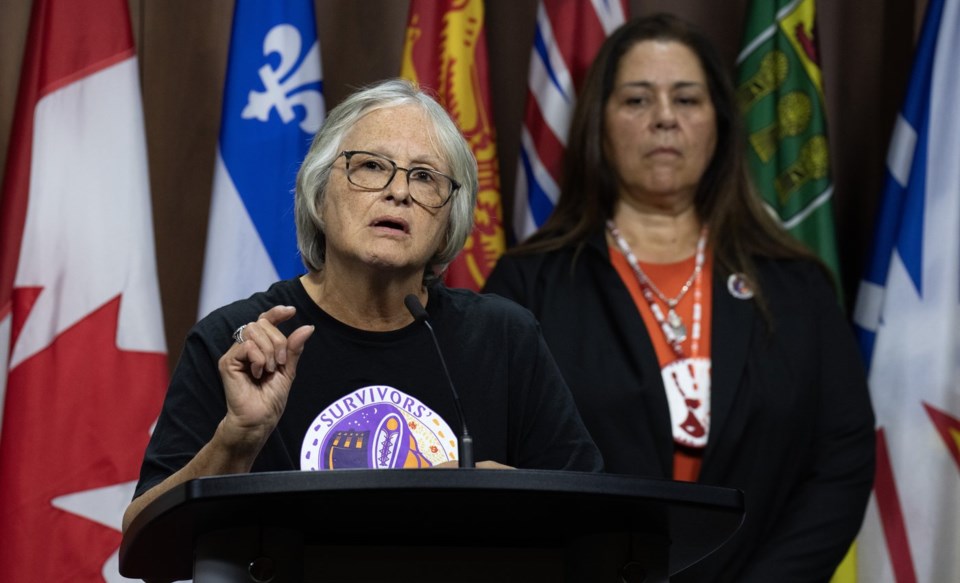OTTAWA — Residential school survivors say the federal government is keeping the truth about those institutions in the dark by cutting back on funding for records and ground searches looking for unmarked graves of children who died at the schools.
More than 150,000 children were forced to attend residential schools, and many survivors detailed the horrific abuse they suffered to the Truth and Reconciliation Commission. An estimated 6,000 children died while attending the schools, although experts say the actual number could be much higher.
In 2021, after numerous First Nations reported locating what appeared to be human remains on the sites of former residential schools, Ottawa stepped in with more than $116 million to search for unmarked graves and to memorialize the children who died. As of March 2024, the government had actually provided $216 million through 146 different funding agreements.
That ended up averaging about $71 million a year.
In the most recent budget, the government allocated $91 million over the next two years to continue to work to look for graves, or $45.5 million a year.
Laura Arndt, the lead for the Survivors' Secretariat, a survivor-led organization seeking to document and uncover the truth of what happened at the Mohawk Institute in Brantford, Ont., criticized what she says cannot be characterized as anything but a funding cut.
Communities and organizations have been investigating residential schools for decades, including through records. The more recent ground searches, using ground-penetrating radar, are being done in the hopes of finding the children's remains and bringing them home.
"We're trying to uncover a history that's 150 years old, and the limited funding we've been provided in three years is not doable," Arndt said.
The Survivors Secretariat has indicated the change will have a dramatic impact on communities who have started their searches and those hoping to secure funding of their own. Communities and organizations were informed via a teleconference with federal government officials, and they say they had their microphones muted and had a limited ability to push back.
"They're waiting for us poor old residential school people to die," said Roberta Hill, a survivor of the Mohawk Institute.
"Well, we're not going anywhere — not yet, that I know of. I said I'll live as long as I can because I want answers and I want the truth. There is no reconciliation — absolutely none — if you're going to lie to us and do this to us."
Over the summer, Crown-Indigenous Relations Minister Gary Anandasangaree reversed a decision to limit each individual community's funding for a search to $500,000. Previously individual allotments were capped at $3 million, and Anandasangaree said that original cap would be restored.
Speaking on Parliament Hill during the Truth and Reconciliation Day ceremony Monday, Anandasangaree wouldn't discuss the funding issue.
"I'll be glad to address this in a more wholesome way later on what we have done," he said in an interview. "And I've heard from survivors and I think we've done the right thing in terms of lifting the cap and we will continue to work with all those who are impacted. And I look forward to having this conversation at a later point."
Scott Hamilton, a professor of anthropology at Lakehead University who has been involved with residential school investigations, said the federal government is obligated to provide communities with the supports needed to complete the work they're doing.
"If we choose to gloss over, if we choose to ignore, if we continue to live in la-la-land that these terrible things didn't happen, or they might not have been as bad as what was said, we're kind of choosing to close our eyes and hum a song so we don't have to bear witness to what happened — to confront the fact that terrible things were done in the name of our nation," said Hamilton.
"An important part of Canadian legacy is to grapple with those dark, painful facts and try to heal from (and) try and seek reconciliation. But one doesn't get reconciliation without acknowledgment of those painful truths."
The Survivors Secretariat released a report Monday calling for 23 million documents to be released to the National Centre for Truth and Reconciliation, along with RCMP records related to missing children and unmarked burials.
It also says Canada needs to provide stable, long-term funding for those investigations, and to allow communities to determine what supports they need to carry out their work.
Arndt said amid a growing trend of residential school denialism, the records and funding to find them are becoming even more important.
NDP MP Leah Gazan introduced a private member's bill in the House of Commons last week that seeks to criminalize residential school denialism, saying it would help stop harm caused toward survivors, their families and communities.
Asked Monday if that bill should get support from all federal parties, Hill said it should "absolutely."
"I'd like them to come forward, face-to-face with us, the survivors who went through all of this," she said.
"We'll tell you it's a reality; it was a reality for all of us."
Prime Minister Justin Trudeau, speaking to reporters in Inuvik, N.W.T., on Monday, said his government has to "look very carefully at this bill," saying whenever there are limits put on free speech, careful steps must be taken.
"Canadians are understanding that recognizing truth and reconciliation isn't about feeling bad or guilty about Canada — it's about committing every day to be a better Canada, and understanding that for us to be the country we all want to be, we need to work hard at reconciliation," he said.
"So we're going to take any proposals by any political party seriously."
This report by The Canadian Press was first published Sept. 30, 2024.
Alessia Passafiume, The Canadian Press




